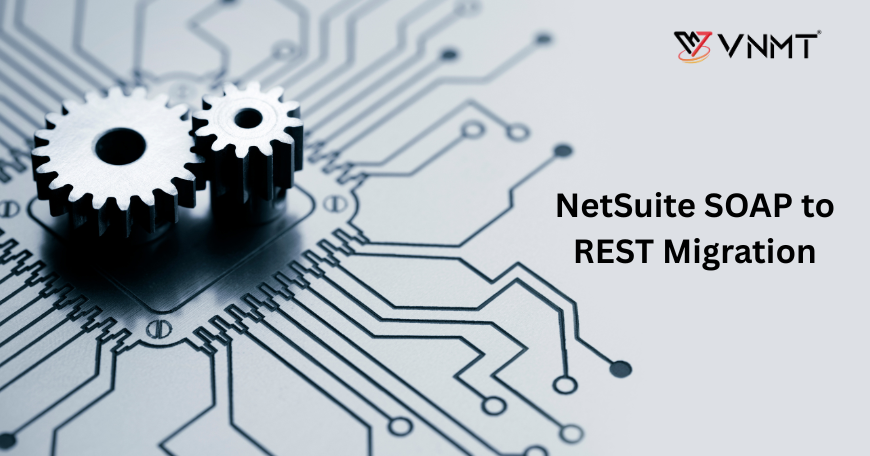Oracle NetSuite has been a reliable cloud ERP system for companies since the early 2000s. With each passing year, it has supported various integration approaches, such as SOAP Web Services. These integration approaches enabled processes to be automated, such as sending bills, synchronizing customer information, or integrating with older software. These services have worked well, but technology has moved forward.
Now, quicker and more secure alternatives such as REST APIs are becoming the norm. That is why Oracle is making a significant shift, i.e., beginning with NetSuite version 2026.1. This implies no new SOAP Web Services will be created by default. This is referred to as the NetSuite SOAP Deprecation.
Is your company still working with SOAP?
NetSuite is embracing modern tools such as REST Web Services and OAuth 2.0, and now it is time to look to the future.
Overview: NetSuite SOAP Web Services Deprecation
Starting with the NetSuite 2026.1 release, Oracle will no longer include new SOAP Web Services endpoints in every release. Instead, new SOAP endpoints will only be added if there is a strong business or technical need. The 2025.2 endpoint will be the last regularly planned SOAP release, and it will be supported until 2028.2.
Thereafter, older SOAP integrations will no longer be supported or updated. This implies that companies using SOAP Web Services must now start preparing for a significant change by migrating to NetSuite REST Web Services and updating any existing connections to make sure they will keep working in the future.
Changes or Updates: What’s New?
NetSuite is implementing several significant changes that impact the way users connect to the platform. If you are already using SOAP Web Services or the older NetSuite.com data source, you should know what is changing and what you need to do.
- Upgrade to REST APIs
SOAP-based integrations will eventually stop working. Oracle advises migrating to REST Web Services, which are quicker, more adaptable, and more secure. Businesses must evaluate existing integrations, redesign workflows, and begin using REST APIs for continuity, decrease long-term expenses, and comply with NetSuite’s latest integration roadmap.
- 3-Year SOAP Support Policy
Each SOAP endpoint will only be supported for three years after its release. For example, 2025.2 will be supported until 2028.2. Once that period ends, the endpoint will stop receiving updates or support. Businesses must plan their integration updates early to avoid disruptions after support ends for older endpoints.
- No More Default SOAP Releases
New SOAP endpoints will no longer be included with every NetSuite update. From version 2026.1 onward, Oracle will only release SOAP updates when absolutely necessary. Users relying on SOAP will not automatically receive new WSDL versions and must start planning to move to SOAP to REST API migration to avoid future service interruptions.
- NetSuite.com Data Source Ends
Oracle has ended support for the NetSuite.com data source as of version 2025.1. This source will be completely removed in 2026.1. That means no more fixes or performance improvements. All users must migrate their data queries and reports to the newer NetSuite2.com data source to continue accessing business-critical data.
- Switch to NetSuite2.com
NetSuite2.com offers improved data consistency and security. It works with SuiteAnalytics Workbook and supports SuiteQL, a newer query language. SQL queries written for NetSuite.com will not work here. Businesses must revise their queries and update tools that rely on the Connect Service to use the NetSuite2.com data source.
- New Authentication Standards
NetSuite is retiring password-based authentication for integrations. NetSuite OAuth 2.0 Migration is now required for secure communication. These modern methods are more secure and support role-based access. Companies must upgrade their authentication setup to continue using NetSuite Web Services securely and remain compliant with industry security best practices.
Why is the Update Good for your Business?
Though short-term migration efforts may be required, the shift improves integration speed, enhances security, streamlines reporting, and prepares your system for future NetSuite releases. Here is what your business stands to gain from acting early:
- Faster System Integrations
REST APIs work faster and are easier to manage than SOAP. They use lightweight data formats that reduce server load and improve system response time. This means your ERP, CRM, and ecommerce platforms can sync data more efficiently and keep operations running smoothly, even during high-volume transactions or updates.
- Future-Ready Architecture
Migrating to REST and SuiteQL ensures your system stays compatible with NetSuite’s upcoming versions. You will reduce the risk of using unsupported tools and avoid rushed upgrades later. To align with Oracle’s direction now means fewer changes in the future, thereby saving time, money, and effort as your business grows.
- Better Data Security
Using OAuth 2.0 and Token-Based Authentication gives your system stronger protection against unauthorized access. These methods meet modern security standards and make it easier to manage access permissions. This reduces the chances of security breaches and ensures compliance with data protection policies across all integrated applications.
- Smarter Reporting Tools
NetSuite2.com paired with SuiteQL allows more advanced, reliable, and consistent reporting. Your saved searches and reports will match, and the data will be more accurate. With role-based controls and better visibility, users can access only the data they need, making your reporting system both powerful and secure.
Important Points to Keep in Mind
- The 2025.2 SOAP endpoint will be the last one Oracle releases on schedule. It will be supported for three years until 2028.2.
- Once an endpoint’s three-year support ends, it will stop receiving updates and eventually stop working completely.
- If you are using the NetSuite.com data source, it will no longer work after the 2026.1 update. You must switch to NetSuite2.com and use SuiteQL.
- Begin auditing your current integrations now. Find out which ones are using SOAP and plan how to move them to REST.
Also Read: NetSuite 2025.1 Release

How Can VNMT Solutions Contribute?
VNMT Solutions understand that this NetSuite update is a big shift that can affect your entire system. We start by reviewing your existing SOAP Web Services and data sources. Then, we create a detailed plan for how to upgrade them to REST Web Services and NetSuite2.com. We use NetSuite Integration with Celigo to automate many parts of the migration, so you experience zero downtime and no disruptions.
With the help of our experts, you can keep your integrations running smoothly, avoid last-minute issues, and move forward with a secure and future-ready system. Book a free discovery call with VNMT today and let us guide you through your NetSuite integration migration.
Follow VNMT Solutions on LinkedIn for expert insights, step-by-step migration tips, integration best practices, and many more.

















